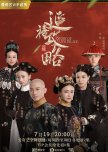
This shampoo has a gay agenda ;)
I'd say A Tale Of Yearning is probably the most sensual ad from the Adolph Shampoo series. There's something about bathing scenes that you really can't get past....The production value of this series is what I'd describe as high-end Douyin – it would be unfair to pit it against mainstream TV ads.
As for the storyline, it does jump back in forth in time a little unnecessarily, but the narrative holds up well. The chemistry between the two FLs is all that matters really (sorry Adolph Shampoo) and it's at its most palpable here. That said, I would prefer if we did away with the violent tropes that often feature in these sapphic tales.
I'm not sure how shampoo sales are going, but I think they've found a narrative formula that works and are running with it.
Was this review helpful to you?

Another crime drama uses women as voyeuristic collateral damage
I'll preface this review by saying that I don't normally watch crime dramas because they're copaganda and certain shows revel in gratuitous violence as a form of voyeuristic titillation. I made an exception for Copycat Killer because of the stellar cast.As far as the twists and turns and pacing of the plot goes, that was all fairly enjoyable. But I was disappointed with three things.
1) The drama follows the tired old trope of unhinged men killing young women. These perpetrators of gendered violence are depicted as social anomalies – as if gendered violence were the result of just a 'few bad apples' – when we know that isn't true. And yes, while this is a work of fiction, I draw a line at gratuitous displays of gendered violence. This drama offers sadistic voyeurism and no critique.
2) I think there was an attempt at some kind of commentary on the spectacularisation of media. It was superficial at best – possibly a very confused take on Baudrillard's Simulacrum – and was ultimately undermined by the drama's own spectacularisation of violence at the meta level anyway (see above).
3) Despite an amazing cast, the actors weren't given a lot to work with. The characters were written in such a way that they were all easily identifiable crime drama 'types' that had each been customised slightly to fit the storyline. I'm not just talking about the unhinged misogynist trope. Male lead as man-turned-judicial-warrior because his family was murdered is a tired old trope. Journalist struggling for justice is a tired old trope. Woman psychologist who serves as a love interest and to give emotional substance to the male lead is a tired old trope. I was even hoping they might do something with Ruby Lin's anchor character but, alas, no.
This very much sucks because these are incredible actors we're talking about. This is the 4th drama I've seen with Chris Wu, 3rd with Ruby Lin, 2nd with Ko Chia Yen, and 2nd with Cammy Chiang. I know they're all excellent actors but because of how their characters were written, they just didn't have room to show off their full ability. That said, they did wonderfully with what they'd been given.
Just to end on a positive note – special mention to the lighting crew and director of photography. There were some beautifully lit and coloured scenes as well as a couple of choice angles used in shots. Nice work.
Was this review helpful to you?

Loved it first watch. Hated it the second.
*First viewing*Internal thoughts: Ok, wow, Zhang Zi Yi should not be playing a teenager but she pulls it off. Yay, so glad that the childhood love interest (simp) was discarded because, what a coward! Why does Zhou Yi Wei get to show his age but Zhang Zi Yi doesn't? And, oh wow, the chemistry between A'wu and Xiao Qi is nothing like I've seen in a Cdrama before. For the first time, I'm actually here for the romance plotline.
However! Something was nagging me throughout watching it, but I couldn't quite put my finger on it. Until I rewatched the series.
––––
*Second viewing*
So turns out the nagging feeling was that, despite the electric romantic chemistry, I hate A'wu as a character. She spends a lot of time condemning the bad deeds of characters who have been forced to make bad choices in desperate situations. Yet, at no point, is she ever forced to choose between her pride and doing 'the right thing'. She has never known real struggle and punishes those who have.
Once I started noticing her classist demeanour, I could not let it go. It just tainted the entire experience for me and I also started hating Xiao Qi for supporting it. His character, despite low class origins, does not call into question the classism of his wife nor the imperial system he helps uphold. Instead, he sees the emperor somewhat as a benefactor and himself as duty-bound to protect a system that, frankly has never protected him.
In this drama, we also have another classic Historical Cdrama example of an emperor who is protected as the 'rightful ruler' but not for any perceivable moral reasons. We have no reason to believe the emperor is a good ruler for his people and uprising is, of course, portrayed as bad and misled. Conveniently, it means that A'wu never has to worry about the legitimacy of her own privileged position.
----
*A note on acting*
While I could never watch this series again, I will say the acting from the leads is superb. Obviously, that goes without saying for Zhang Zi Yi. This is the first time I've seen Zhou Yi Wei (other than a bit character in Glamorous Imperial Concubine) and he is absolutely magnificent. It's a shame ageism is so rampant in the entertainment industry because I'd love to see older actors take the stage in these kind of roles more often.
I've now seen Tony Yang in Rebel Princess as well as Light the Night and, boy, does he have range! I hated his character in this series and that was due to some great acting on his part.
Was this review helpful to you?

This review may contain spoilers
Wei Yingluo is a class traitor. Change my mind.
Ok so there are already like 80 reviews for Story of Yanxi Palace so I'm going to concentrate on the power politics of the show. And my god, is it juicy.First, the class politics of Yanxi Palace was what snagged my interest in the first place (I'll get to the gender politics too, don't worry). Wei Yingluo hits the bottom of the Palace rung very quickly in the story. In most palace dramas, servants are either loyal, obedient and therefore good. Or they're ambitious and put their own survival before their master's and therefore bad. In this case, we follow Wei Yingluo as she rises the ranks but she is neither demonised nor condemned by the storyline in the process.
At one point, she is literally cleaning out chamber pots and dealing with faeces everyday. Yanxi Palace is not afraid to show the ugly and brutal lower end of Palace activities, when most other Palace dramas would only ever let it happen off-screen. But it's here, at her lowest, that Wei Yingluo befriends an equally disgraced eunuch, Yuan Chunwang. Eventually, the two decide to stick by one another and promise to never betray each other.
The first half of the series sees Yingluo forge powerful protectors, even as she lands herself in trouble, and portrays her positively as a maid on a mission for revenge. In most other palace dramas, a servant who defies authority in the way she does would only get a few lines of dialogue before they're taken off to be brutally punished or killed, normally off-screen.
However, Wei Yingluo is individualistic in her ambition. And despite promises made to her confidante, Yuan Chunwang, she makes a bid for power when she finds a strategic opportunity to do so. From this point on, the class politics of Yanxi Palace folds in on itself. Yingluo ends up conforming to the same class system that had sent her to scrub faeces off barrels. She fills in the shoes of a master and plays the part.
Meanwhile, Chunwang supports a failed overthrow of the emperor and loses. He pays the ultimate price and Wei Yingluo never does provide a convincing answer when he declares that she betrayed him first. Of course, Emperor Qianlong's power is never called into question. I think you're just meant to assume he's a good emperor.
And this is where the class politics and gender politics overlap. I like harem dramas because it's all about the power pull-and-push among women who struggle in the most difficult circumstances. Because, at the end of the day, none of them hold absolute power. In the palace, that belongs to the emperor. Before marrying, that absolute power would've presumably resided with their fathers and/or leader of their clans.
So the ending of Yanxi Palace was, for me, infuriating. Yingluo now declares – after admitting many times in the past to be really only in it for the hustle – to love the emperor. Not only is this very hard to believe canonically given the lack of chemistry between the two characters, but also undermines a lot of what Yanxi Palace had going for it.
As I said before, Emperor Qianlong's power isn't really ever critiqued (even with the coup). All the evil consorts, concubines and servants have been duly punished for their deeds, and yet the emperor, despite his sins, goes unscathed. It almost feels like Yingluo has lost because she admits to falling in love with the emperor. All that work she put in to defy the odds over dozens of episodes seems to unravel.
If anything, the only score any of the women get against Qianlong is when the Fuca Rongyin refuses to play the role of Empress by taking her own life. None of Yingluo's backhanded quips compare to this 'f–– you' moment from Fuca who, even if momentarily, pulls the rug from out under Qianlong's feet.
I will finish this off with just a quick point of reference to Ruyi's Royal Love in the Palace given it covers the same characters and time period. While Ruyi's Royal Love did poorly on its class positioning (my review on the series goes into that more), what it does do better than Yanxi was appropriately vilify the emperor. It is interesting to see how much Yanxi Palace's depiction of Fuca Rongyin and Ruyi's Royal Love's depiction of Ruyi had in common. Both dramas are tragedies if you read them a certain way.
Was this review helpful to you?

A lesbian romance steeped in tragedy
A tale where two women's love for each other never wanes, even during the darkest moments. Oh, and Wallace Huo is there. He plays the role of a glorified sperm donor.Ok but seriously, hear me out. The romance arc of this drama becomes a lot more interesting when you read Yu Hailan as gay and Ruyi as bi (and, frankly, who cares about the Emperor). The more life in the Palace beats down Ruyi, the more Yu builds her strength so she can come out batting for Ruyi. Ruyi may not cherish Yu as much as Yu cherishes Ruyi, but Ruyi confides in her more than anyone else. They live together for a while. I mean, c'mon, they raise two kids together. But, sure, tell me they're just "good friends".
I do love a good tragedy and I think this series really threw punches in the last dozen or so episodes. However, I found it really hard to support Ruyi wholeheartedly as the protagonist. That's mostly because she embodies the terrible class politics of the drama.
This drama follows the usual historical Cdrama trope of: servants who are loyal and obedient are good, servants who dare have ambition and question authority are bad. I beg to differ from one of the other reviews and I argue that Ruyi is not an underdog. She may not directly murder anyone but a lot of people die or are grievously harmed due to her failure to protect them. Her refusal to engage in palace intrigue costs lives because, up until almost the end, she believes her judicial innocence to be protection enough. A lot of people sacrifice themselves for Ruyi but, ultimately, she does little self-sacrificing in return (though she's happy to offer a lot of unhelpful pity). At the same time, Wei Yanwan is depicted to be of poor character before she even starts harming people, because she dares to be a servant who wants to break free of her status and aim high.
A natural comparison point here is Yanxi Palace which depicts the same characters, around the same time period (slightly shorter span), and was aired in the same year. In the first half, Yanxi Palace does depict the rise of an underdog – it shows a servant rising through the ranks without demonising her character in the process. That said, it does undercut its own class politics in the second half, but I explain that more in my review of the series.
I will round this off by saying the acting in Ruyi's Royal Love in the Palace is incredible. I found Wallace Huo to be a little lacklustre in the first half but when he switched, my god, did he switch. So I changed my mind pretty fast. Special mention goes to Vivian Wu who beautifully portrayed a deeply complicated character. I think the only reason I'd rewatch this drama would be to just focus on her and her character's development.
Was this review helpful to you?

How do you articulate something that can't be spoken?
It's a common assumption that our memories work like a filing cabinet; that our brain captures moments as documents that we can pull up and view later until they're so old they disintegrate. But that isn't how our minds work at all. Memory is slippery. And when we experience traumatic events, our survival instincts overtake everything else. Yet it's the first way of thinking that shapes the expectations lumped onto survivors of sexual violence – how we should behave and remember events. It's a heavy burden to bear.Shards of Her is the first piece of cinema I've seen that captures the relationship between trauma and memory so well. The strength of the drama is in its fragmented – and intentionally unreliable – storyline. Except for hints along the way, we as the audience can only accept the reality offered: the one that Lin Chen Xi experiences. We are disoriented and confused too. We are uneasy. We are pulled through Chen Xi's life like a knotted thread through cloth.
Unlike more black-and-white film depictions of survivor stories, Shards of Her moves beyond a victim/perpetrator binary. The drama explores the degrees of culpability resting with certain characters but without being didactic in its judgement. It's a nuanced approach I wish we saw more often.
While the strength of this drama is in its storyline and characters, I just want to note that there are some beautiful landscape shots in the scenes set in Chen Xi's hometown. Some of the music timing and choices were a bit of a let-down, however.
I highly recommend this drama but please proceed carefully. As a sexual violence survivor myself, there were a few moments that were alarmingly close to home for me. By that point in the storyline, I saw it coming, so it was fine. But please take care. All in all, a stunning series.
Was this review helpful to you?

This review may contain spoilers
Where are my anti-colonial babes at??
Given there are already 100+ reviews of Empress Ki, I'll focus on the colonial power politics of the show, as that's what drew me in. But like, did no one else watch this show because of it's anti-colonial themes??This Kdrama is the first historical one I've watched in a long time. Usually, I watch Chinese palace dramas, but dealing with Chinese censorship rules limits the exploration of history and I don't enjoy analysing propaganda that much. In contrast, Empress Ki is unfettered.
toxicbybritneyspears's review mentioned "national identity" as a key theme of Empress Ki. I agree but would extend that further by arguing that the drama examines the complexities of national identity as it intersects with colonial politics. While watching Empress Ki, I automatically started comparing it to Mr. Sunshine (South Korea, 2018), which features anti-colonial resistance during Japan's colonisation of Korea. Mr. Sunshine attempts to grapple with classism clashing with resistance efforts led by nobility and aristocracy, but ultimately fails. Empress Ki, despite also falling short in a similar grappling, does provide a wider range of characters portraying the difficulties of unified anti-colonial resistance.
For context, the drama is set during the 1300s when Korea (then known as Goryeo) is under Yuan dynasty rule (Mongol empire). From the drama's start, Goryean characters have starkly different experiences of colonization. There's a king (Wang Yoo) dealing with powerlessness. A surviving daughter (Seung Nyang) navigating the death of her mother at Yuan hands. An ambitious man of poor background (Byung Soo) betraying Goryeo for survival. Other Goryeo citizens live in Yuan, either in the Goryeo ghetto or in the Yuan Imperial Palace as staff. These experiences result in a wide range of actions, from outright defiance of Yuan rule to willing collusion with the Yuan regime.
Circumstances suggest there's no hope for Goryeo to achieve complete autonomy from the Yuan empire (or so the drama implies). Wang Yoo's ambition is to reclaim his throne, implying that under his control, collusion with the Yuan dynasty can end, and he will strengthen the country for the sake of his people. Seung Nyang takes a different approach: high-level infiltration. Climbing the ranks, she eventually becomes Yuan Empress with considerable political influence, claiming to use it for the benefit of the Yuan people and those from Goryeo living in Yuan. They both execute these strategies better than expected given the stakes.
However, my main frustration is that while these characters make grandiose statements about improving the lives of ordinary citizens, these everyday folks are given meagre screen time. We don't see much of everyday Goryeo people beyond Seung Nyang's early gang days. The people in the Goryeo ghetto seem to lack agency, relying on the whims of Seung Nyang or Wang Yoo. The drama even depicts the villagers as ungrateful when Wang Yoo visits the town (for his own political aims). Palace staff who won't support Seung Nyang's schemes receive similar dismissive treatment.
And that brings me to Byung Soo. Early on, he explains his betrayal of Goryeo, stating Goryeo did nothing to protect him as his family struggled to survive in a poverty-stricken country. Someone, perhaps one of Wang Yoo's men (or Wang Yoo himself, I can't remember), remarks that the Yuan dynasty is to blame. True, but not the whole story. Byung Soo articulates the struggle of the working class and poor who can't afford to think beyond day-to-day survival. What's the point in fighting for a kingdom that forces its people to serve another nation and rejects those who manage to return to Goryeo soil?
For me, that should have been the crux of the drama. Yet, it's not until the final few episodes that Empress Ki turns its attention in that direction. Seung Nyang and Eunuch Dok Man express their internal conflict of national identity, suspended between Yuan and Goryeo. Seung Nyang, focused on personal revenge, hasn't grappled with this conflict until then. Dok Man must choose who to back, his choice bound up in which nation he wants to support. Yet, his character isn't fleshed out to bring that discussion to the fore, and he is seemingly rewarded for choosing to back Seung Nyang, while Byung Soo is killed for betraying her.
I wonder whether Byung Soo's character represents some laziness from the writers, perhaps due to the drama biting off more than it can chew. When Seung Nyang looks down on Byung Soo's corpse and expresses remorse for how Goryeo's abandonment of him led to his actions, one wonders why he was condemned for actions seemingly deterministic.
And on a similar note, why aren't the villagers given their own chance to contribute to resistance? Surely, they have the ability to organise collectively and take some power, even if small, into their own hands?
In the end, I think Empress Ki was onto something by drawing out ambiguities. Initially, I worried it might end up oversimplified like Mr. Sunshine or with a Stockholm syndrome-y assimilationist tale, as in The King's Woman (Chinese, 2017). However, given the extensive screen-time, there was a missed opportunity to delve into the trickier elements of colonial power politics.
Was this review helpful to you?

A promising parody betrayed by its own attempts at sincerity
I was immediately sucked in by the premise of My Only Love Song: A high-profile actress featuring as the FL in a historical K-drama is taken back in time to the actual historical setting of the drama. Hilarity unfolds as k-drama tropes clash with historical reality.Except that's not what happens across the 20 episodes. For an episode or two, it looked like the drama was heading in that direction. But then, for whatever reason, the writers decided to change tact and pursue a typical k-drama romance plotline in a historical setting. There was still a strong comedic element running throughout but it wasn't satirical in any way.
I felt a bit betrayed. The romance plotline was boring and cliché. However, the absurd humour kept me going – with special mention going to Park Joo Hyung's truly delightful performance. This drama is a fun time but with a lot of wasted potential.
Was this review helpful to you?

This review may contain spoilers
Can we have more queer coding and less toxic men plz?
The Story of Kunning Palace has a fantastic premise. It starts where most historical Cdramas end: a despotic empress dies after losing a coup d'état. But lo and behold! She suddenly wakes up, reincarnated in the same life but as an 18 year old again, with a chance to set things right.For fellow fans of the latest isekai craze that has hit the anime scene, this plot may sound familiar. But unlike the comedic anime takes that places anime FLs in otome games, Kunning Palace takes itself far more seriously. Our FL is determined to do the right things by the people she wronged the first time round and does not mind using some underhand methods to do so. Along the way she (once again) meets the ML who, similarly, has good intentions and subscribes to an ends-justify-the means approach. A perfect match, right? So I thought initially.
Frankly, I quickly lost interest in the political intrigue of this drama and stayed around for the romance. Unfortunately, a gross error on my part. What the drama tries to construe as romance – I can only assume this from the sappy romantic soundtrack – is actually just the ML sexually assaulting the FL. Sorry to be blunt, but that's what it is.
This sexual violence would not have been an issue if the drama treated it as such. But with both the soundtrack and with the ML lead 'winning' the FL in the end, what the drama does instead is normalise violence in a romantic/sexual relationship. Ultimately, this ruined what I liked about the drama – two deeply flawed characters finding each other as soulmates.
Given this situation, I would have loved to see more romantic development with the FL and other characters. Obviously being a Chinese production, there's only so much you can do given censorship (especially recent crackdowns), but there was already clear queer coding happening between Jian Xue Ning and the Princess and You Fang Yin respectively. Perhaps this can be my pitch for a Kunning Palace baihe spin-off :)
Was this review helpful to you?

A perpetual coming of age
Honestly, I'm still not 100% sold on whether one can really call Ainu Mosir a coming-of-age film. It follows teen Kanto as they try to figure out their Ainu identity. Yet, I would argue, this has very little to do with the childhood-to-adult convention of usual coming-of-age stories. Or, perhaps, that the age distinction is simply irrelevant.Kanto is far from the only one in the Ainu village community who is struggling with their identity. Debo, for an adult example, struggles in his own way with his Ainu identity, He expresses his uncertainty even as he tries to impress on Kanto the importance of being Ainu. Arguably, Debo too is undergoing a coming-of-age process.
What this film does well is sit in discomfort. I agree with JennyStuckOnThatRooftop's review in that I believe this film refrains from "judging". However, I don't think it's offering social commentary per se. It's more observational in its style and while there is certainly deliberate framing at play, I wouldn't go as far to say that's it editorialising. Instead, it allows for messy nuances and seeming contradictions to unravel on screen.
Sure, it's a quiet film as far as dialogue is concerned. But I found it noisy viewing: you can clearly hear the characters' thoughts among the rainfall or the crunch of snow. No one seems to really know their place in the world but they exist regardless.
Was this review helpful to you?

Eehhhhh
Look, it's a cute idea. But I think if you want to watch a good crime/fairytale blend, you're better off watching Hoodwinked (2005).Once Upon a Crime is a whodunnit lazily mashed together with a Disney-esque Cinderella story (I'm referring the animated one, not the kickass Whitney Houston one). The characters have no depth, nor is the world-building overly creative. I don't mind a bit of oddball humour but it ended up being annoying.
It's a shame. I think if the creators had thought outside the box a bit, this could've been decent. I got bored and dropped it around 30min in.
Was this review helpful to you?

Would you like a side of class commentary with that?
The social criticism of this film is about as subtle as, well... plonking a massive rack of meat on a table and calling it a "sacrificial feast" for your wealthy onlookers.On the one hand, Hunger bangs you over the head with a wok while screaming, "rich people are evil" (facts) and asks you to maybe go touch some grass. On the other hand, it undercuts its own attempts at class commentary by erasing nuance and thereby failing to really contribute anything insightful.
I think if you want to watch something that leans more into the power dynamics and social criticism but still centres on food, I'd recommend The Platform (2019, Spanish).
That said, the production quality of the Hunger is top tier. It's worth watching purely for some of the cinematographic moments. The soundtrack is strong as well. Though I would've liked more of those jazz elements from the opening scenes to have been used later in the film too.
It may look like a long run time but it goes fast. Terrific pacing means this one is an easy watch for a Friday or Saturday night. Best served with the cheapest cook-up or takeaway you can muster.
Was this review helpful to you?

This review may contain spoilers
Awful
That's not to say the film-making is awful. But this story will devastate you.**CW: domestic violence, rape**
If you're not one yourself, you would likely be well aware of the intensity that comes with being a true fangirl. In this case, Jane is a typical pop fangirl, willing to go to extreme lengths to be in the presence of her idol, Paulo. She attends a fan event and semi-accidentally ends up in the back of Paulo's ute. He starts driving home, unaware of his passenger.
Paulo's public-facing mask slips quickly but it takes more than a couple of uncouth moments for Jane's fantasy to falter. With Jane trying to play adult, even after Paulo reveals his true character at home, events spiral into darkness. The contrast between the idol she revered and the mundane man before her is shattering.
Now, it's at this point where I feel iffy about this film. Paulo rapes Jane. And while it may not look like it on the surface, this is the point of rupture for Jane.
If you've ever had even passing knowledge of pop idol stans, you would know that sexual fantasies play an important (even if not always outrightly acknowledged) role in a lot of fan culture. The online proliferation of fan-created smut is testimony.
Consequently, we fully expect that Jane has had similar fantasies around sleeping with her idolised image of Paulo. The rupture occurs because when the encounter does happen in real life, it's literally and metaphorically a painful departure from the daydreams.
The rape scene also marks a turning point in Jane's own character development for the final part of the film. It's after this stage that she starts identifying Paulo's abusive behaviour with that of her mother's abusive partner.
I'm iffy about the rape scene because I'm not sure the full gratuity was necessary. However, I don't think censoring it would've really helped so perhaps it does have a place.
In light of the ambivalent ending of the film – (which I liked, with it's cynicism or hope, depending on how you read it) – the story would've likely have packed a bit less of a punch.
I was absolutely wrecked when I first finished this film and originally tried to forget it. But now that a bit of time has passed and I've rewatched the ending, I think it's brutality is its selling point.
It's a reminder as to why we use idol fandom as a form of escapism in the first place. The sweet manufactured nature of pop culture appeals because it's so remote from real life. Who wouldn't jump in the back of their idol's car when given the chance?
Was this review helpful to you?

A meta blend of fiction and documentary
Or as Peter Bradshaw, writing for The Guardian, put it: "Buddhist supernatural realism".By the Time It Gets Dark has a clear point of departure: The 1976 Thammasat University massacre. The film draws its initial reflections from the few photographs available from the time, before spending the rest of the film shifting between gaps, silences and layers around and beyond the historical event.
The majority of By the Time It Gets Dark follows the journey of the film-making itself. Not in a behind-the-scenes way, but the struggle of the craft in attempt to convey meaning. It's self-reflexive while, at the same time, not shunning the audience. Don't worry, this isn't one of those arthouse films that experiments for the sake of self-indulgence. You can sense the creators' desire to grapple with the 1976 massacre while struggling to develop and articulate its meanings on multiple levels.
It's not trying too hard, nor is it a chore to watch. When you take this film for what it is, you're able to appreciate it more.
When Ben Kenigsberg from the New York Times said if there couldn't be explanations, then at least there should be "footnotes" and that it'll go over the heads of those not "in sync", I think it's important to note that being "in sync" is besides the point. The visual glitches and play with colour saturation near the end of the film show that that even the creators themselves aren't "in sync" with what is being (or not being) represented.
I don't have this film figured out and you're not meant to. By the Time It Gets Dark is one of those artworks, like poetry, where, if you're trying to figure out what it's 'saying', then you're misunderstanding its existence. If it lingers, then that is sufficient.
Peter Bradshaw's Guardian Review: https://www.theguardian.com/film/2017/jun/16/by-time-gets-dark-review-bangkok-protests-massacre-anocha-suwichakornpong
Ben Kenigsberg's NYT review: https://www.nytimes.com/2017/04/13/movies/by-the-time-it-gets-dark-review.html
Mark Kermode's Guardian Review (I find his reading to be more generous): https://www.theguardian.com/film/2017/jun/18/by-the-time-it-gets-dark-film-review-dazzling-reflections-thai-history
Was this review helpful to you?

Watch this instead of House of Cards
Obviously the House of Cards comparison is a stretch but this is undoubtedly a political drama through and through. Yes, there is a strong romance plot most of the way through but it's heavily embedded in the political plot mechanisms.I think the acting and the characters of this drama are superb. The ML and FL especially break free of most historical Cdrama tropes. So that in itself kept me engaged: I wanted to see their developments arcs. And except for the ending, as noted in every other review, the series delivered.
What let Rise of the Phoenixes down for me was the plot. At first, I enjoyed that the writers had prioritised the political plot over the romantic one (normally in these types of dramas, the formers serves just as a prop for the latter). However, at around the half way point, the pacing became bogged down. From there on in, I felt like I was wading through molasses. It was still worth it in the end purely for a few of the support characters that were put on more display in later episodes.
I've now seen this series twice despite the drawbacks but I still don't think I'd recommend it. I don't know, it's a tricky one.
Was this review helpful to you?




